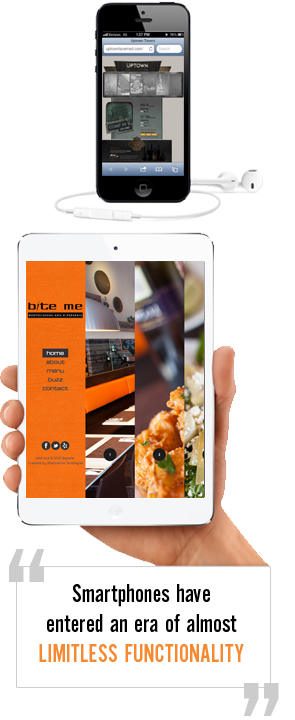Remember the days when phones were actually used for talking? Or how about phones with antennas... or cords?!
Of course not, because that would date you.
But let's say you've read about this time in history. The fact is, phones were once simply just a channel for verbal communication.
Similar to its antagonistic form, the living organism, the phone has adapted to changing times. It's safe to say that Darwin's Galapagos research wasn't intended to explain technology's evolution, but conveniently enough, it does. Like humans, the phone dropped its tail, learned to write, and got smart.
As we enter 2013, the phone has transformed in many ways, ultimately reaching its current, most advanced state: the mobile smartphone. From emailing and music sharing, to social networking, smartphones have entered an era of almost limitless functionality that presents a strong opportunity for consumer access to your company's brand.
Today, more than ever, people are connecting themselves to new and familiar companies through online channels, and mobile devices are rapidly becoming the primary tool being used for such contact.
Smartphones and tablets should not be overlooked when presenting your company to an online market. People are no longer just looking at your website at a desk or purchasing your products with a click of a mouse. They are also viewing your website and products on a mobile device, or at least they are attempting to do so. Most likely, your website was constructed for desktop viewing, which may significantly affect the consumer's mobile experience of your brand; but alas, there's a solution! Mobile versions of websites, as well as mobile applications now provide a convenient, easy, and efficient means to experience your brand online and on-the-go.
Here are a few reasons why you may want to consider developing a mobile website or application for your company.
-
The Value of Mobile Websites
- The Apple Doesn't Fall From A Flash Tree. If your website utilizes flash and it's being viewed on an Apple mobile device, you're sure to have missing components from your website as Flash content is not currently viewable on the iPhone, iPad and iPod Touch. Instead of using Flash, mobile websites are formatted to work on most mobile devices (including Apple), so no flash is used and your content is viewable.
- Pixel Perfect Perspective. As mentioned above, most sites are formatted to be viewed on a desktop which, on a smartphone or tablet, may not visually translate well. For this reason, the size of your site shrunk down to a mobile browser may be too small to fully comprehend. Consumers will more than likely have to zoom in or shift throughout the page to fully grasp the site.
- Clean As a Digital Whistle: Though your website may look great on a desktop, it may convert into a hot mess on the mobile front. A consumer using a mobile device cares less about the glitz and glamour of your company's website and more about easily accessing information.
- More Content, Less Pin Wheel: To reiterate, you don't need all the glitz and glamour for a mobile site. Most likely, a mobile user is in need of your company's details--and they want it fast. Today, consumers crave quick satisfaction, and fast information provides that. With a mobile site, content is uploaded for quick accessibility, and the faster your content reaches the end user, the greater the likelihood your brand appeal will increase.
- Push and Shove: With mobile applications, typically those who download your app are already loyal customers or fans of your brand. With an application, your company has the capacity to provide these people with incentives, updates and specials through push notification, which is a powerful tool on the mobile device. Like a text message, this notification service can be used to reach users directly and in real-time based on multiple factors, including their immediate proximity to your business.
- Easy, Breezy, Beautiful eCommerce: If your company is selling its products online, a mobile application may serve as a more powerful tool than a mobile website. Combined with the push notification tool, an application can function like a digital catalog of your products while providing clean and easy purchasing accessibility.
- Swag: Truthfully, it's an upper hand against your competitors that's just downright cooler.
The Value of Mobile Applications
Still wondering if your company needs to jump on the mobile wagon? Grab hold of a smartphone and access your website (or any website). Is it easy to browse through? Is it clean? Is it efficient? If you answered yes to all, you're most likely on a mobile version already. If not, you may want to think about the value of mobile websites and mobile applications, because in the end, the price to develop these is incomparable to the value of a happy customer.

